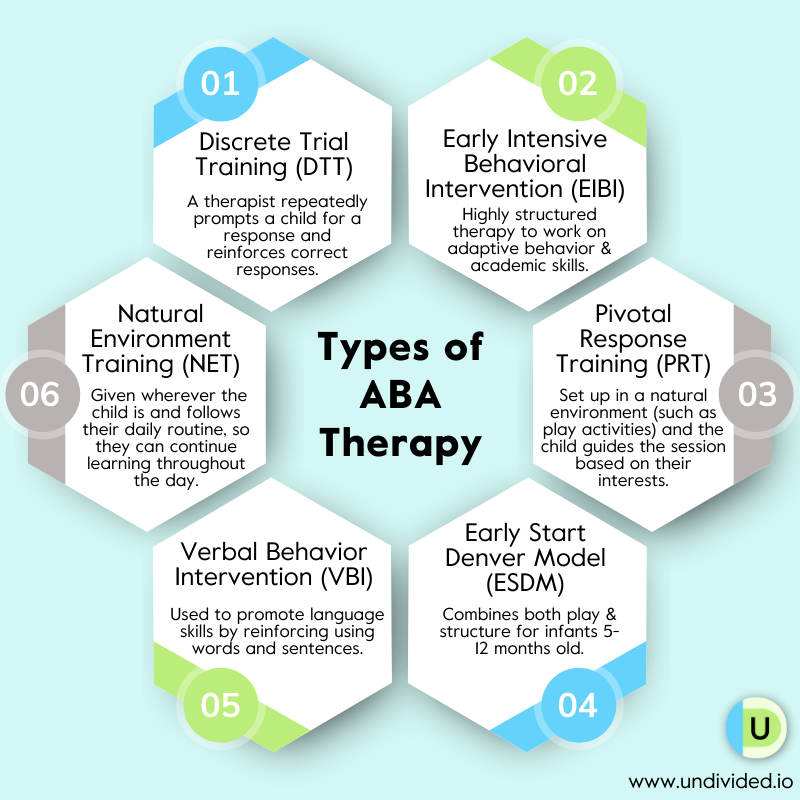Why ABA Therapy is trusted by families
Wiki Article
Comprehending the Effect of Behavior Therapy on Mental Health And Wellness
Behavior therapy plays a vital duty in boosting psychological health and wellness. It makes use of structured strategies to determine and alter adverse habits and thought patterns. By cultivating self-awareness and psychological resilience, individuals can create much healthier coping techniques. The subtleties of its effectiveness across various psychological health problems and its assimilation into day-to-day life remain intricate. Exploring these aspects discloses the profound impact Behavioral Therapy can carry total lifestyle.The Principles of Behavioral Treatment
Behavioral Therapy is grounded in the principles of learning theory, emphasizing the role of evident habits in mental health treatment. This approach is based on the facility that habits are learned and can be unlearned or modified through ideal treatments. It concentrates on the interaction between thoughts, actions, and sensations, positing that changing maladaptive actions can cause enhanced mental and psychological health.Central to this therapy is the idea of reinforcement, where positive or adverse stimuli affect actions modification. Additionally, Behavior Therapy focuses on quantifiable end results, aiming to track progress through visible adjustments. It likewise identifies the relevance of context, supporting for an understanding of environmental elements that add to behavior patterns. By applying these concepts, Behavioral Treatment addresses a wide variety of psychological wellness problems, making it a flexible and reliable treatment option for people looking for to enhance their mental health and wellness through structured behavior adjustments.
Common Strategies Utilized in Behavioral Therapy
Typical techniques utilized in Behavior Therapy play a necessary role in addressing numerous psychological health problems. This discussion will highlight cognitive behavioral strategies, direct exposure therapy techniques, and support strategies, each contributing distinctively to the restorative procedure. Understanding these methods can enhance awareness of just how Behavior Therapy effectively advertises psychological wellness.Cognitive Behavioral Methods
While different approaches exist within the domain name of therapy, cognitive behavioral techniques stand apart for their organized approaches aimed at attending to adverse idea patterns and habits. These strategies normally include recognizing altered cognitions, challenging these ideas, and changing them with even more well balanced perspectives. Common approaches include cognitive restructuring, where individuals discover to identify and customize their automatic negative thoughts, and behavioral activation, which encourages interaction in favorable tasks to deal with feelings of anxiety. Furthermore, mindfulness practices are typically incorporated to enhance recognition of ideas and feelings without judgment. By systematically functioning with these techniques, individuals can develop healthier coping mechanisms, eventually causing boosted psychological wellness and durability versus various psychological challenges.Exposure Treatment Approaches
Direct exposure therapy methods are commonly acknowledged as efficient strategies within Behavioral Treatment, especially for treating anxiety problems, phobias, and trauma (PTSD) These techniques include gradual direct exposure to feared stimuli, allowing people to face and refine their fears in a controlled setting. Typical techniques include systematic desensitization, where people are slowly subjected to anxiety-provoking situations while practicing relaxation techniques. An additional method is flooding, which engages individuals in their anxieties for a prolonged duration, frequently causing rapid desensitization. Virtual fact direct exposure treatment has actually additionally obtained appeal, allowing people to engage with digital environments that simulate their anxieties. In general, direct exposure therapy techniques aim to reduce evasion actions and assist individuals establish coping methods, inevitably improving psychological wellness and wellness.Reinforcement Strategies Discussed
Support techniques play an important role in Behavioral Treatment, using various strategies to urge wanted habits and lessen undesirable ones. Positive reinforcement includes awarding a behavior, making it most likely to persist. This can consist of spoken praise, tokens, or concrete incentives. Unfavorable support, on the various other hand, involves removing an unpleasant stimulus when a preferred actions happens, thereby boosting its frequency. Punishment strategies might likewise be used, where an undesirable repercussion complies with an undesirable habits to minimize its incident. Furthermore, shaping methods slowly reinforce closer estimates to the wanted actions. By using these methods methodically, therapists can efficiently customize behavior patterns, promoting mental health and wellness and enhancing general wellness for individuals seeking support in handling their problems.Efficiency of Behavioral Treatment for Numerous Mental Health And Wellness Issues
Behavior Therapy has shown substantial performance in treating numerous psychological health concerns, especially anxiousness disorders and clinical depression. Research study indicates that people undergoing Behavioral Treatment often experience remarkable enhancements in managing their signs. This conversation will explore the details success rates linked with these treatments for anxiousness and depression.
Stress And Anxiety Conditions Treatment Efficacy
Although stress and anxiety problems can substantially impair everyday performance, research study consistently demonstrates the effectiveness of Behavioral Treatment in relieving symptoms. Various types of Behavior Treatment, consisting of cognitive-behavioral treatment (CBT), have shown significant success in dealing with anxiousness disorders such as generalized anxiousness problem, social anxiety condition, and panic attack. These treatments concentrate on recognizing and customizing adverse idea patterns and habits, furnishing individuals with dealing approaches to handle their anxiousness. Studies indicate that patients frequently experience a decrease in anxiousness levels, improved coping mechanisms, and boosted overall top quality of life adhering to treatment. Furthermore, the structured nature of Behavior Therapy allows for measurable development, making it a favored option amongst psychological health and wellness professionals for addressing anxiety-related concerns successfully.Clinical Depression Monitoring Success Rates
Stress and anxiety disorders and clinical depression commonly co-occur, bring about overlapping treatment approaches, particularly in the domain of Behavior Therapy. Research suggests that cognitive-behavioral therapy (CBT), a popular form of Behavior Treatment, has shown substantial success in handling clinical depression. Studies disclose that about 60-70% of people obtaining CBT for anxiety experience a noteworthy reduction in signs. This effectiveness is Go Here credited to CBT's organized technique, which outfits people with coping mechanisms and cognitive restructuring strategies. Furthermore, the mix of Behavior Treatment with pharmacotherapy can enhance success prices, using a thorough technique for those fighting with severe depression. On the whole, Behavior Treatment stays a pivotal intervention for boosting psychological health and wellness end results in people dealing with clinical depression.The Role of a Specialist in Behavior Modification

Therapists serve as overviews and facilitators in the technique of Behavior Treatment, assisting clients navigate their challenges with structured interventions. They utilize numerous strategies, such as cognitive restructuring and direct exposure therapy, to aid customers in identifying and modifying maladaptive habits and believed patterns. By developing a helpful and non-judgmental atmosphere, specialists foster depend on, which is important for efficient healing engagement.
Therapists additionally inform clients regarding the principles of Behavioral Therapy, enabling them to comprehend the reasoning behind details techniques. This knowledge equips customers to take an energetic duty in their therapy. Additionally, specialists keep track of progress, readjusting treatments as required to ensure the very best results. They give responses and motivation, reinforcing positive changes and assisting clients create coping approaches for future obstacles. In general, the specialist's role is crucial in assisting clients toward boosted mental health and boosted wellness via structured restorative techniques.

Long-Term Advantages of Behavior Modification
While many individuals seek Behavioral Treatment to attend to immediate obstacles, the long-lasting advantages expand far past initial symptom relief. One significant advantage is the development of coping approaches that improve psychological durability, permitting people to navigate future stress and anxieties better - ABA Therapy. Customers typically report enhanced self-awareness, which cultivates a greater understanding of their habits and ideas, facilitating much healthier decision-making processesOn top of that, Behavior Therapy can cause continual renovations in social relationships. By discovering efficient communication and analytical skills, individuals might experience deeper links with others, decreasing sensations of isolation. Lots of discover that these restorative methods add to a positive approach to psychological health and wellness, enabling them to handle potential problems prior to they escalate.
Eventually, the long-term influence of Behavior Treatment can result in a much more satisfying life, identified by boosted psychological stability, improved connections, and a better sense of general wellness.
Incorporating Behavior Treatment Into Every Day Life
Building on the long-term benefits of Behavioral Treatment, incorporating its principles into life can additionally enhance emotional durability and wellness. Individuals can begin by incorporating simple strategies, such as cognitive restructuring, which entails tough negative ideas and changing them with even more favorable options. Developing a regimen that consists of mindfulness practices, like meditation or deep breathing, can also promote understanding of emotions and behaviors.Establishing achievable goals and commemorating tiny triumphes can enhance self-efficacy and inspiration. Taking part in routine exercise not only boosts state of mind however also helps preserve the discipline discovered through therapy. Additionally, cultivating helpful connections and open communication can provide important emotional support. By proactively using these Behavior Therapy techniques, individuals can cultivate a much healthier attitude, browse everyday challenges better, and add to a general improved top quality of life.
Frequently Asked Questions

The Length Of Time Does Behavior Modification Normally Last?
Behavioral Treatment generally lasts from a couple of weeks to several months, relying on particular issues and private demands being attended to. Sessions normally take place weekly, with progress analyses guiding the duration of the therapy.Can Behavior Modification Be Done Online?
Behavioral Therapy can undoubtedly be conducted on the internet, utilizing video clip conferencing systems. This method supplies adaptability and access, permitting individuals to engage with their specialists from the convenience of their homes, preserving healing continuity.What Should I Expect in My First Session?
In the first session, clients can anticipate an initial conversation, analysis of their issues, and facility of treatment goals - ABA Therapy. The therapist might clarify the procedure and resolve any type of concerns to develop a comfortable atmosphereAre There Any Kind Of Side Effects of Behavioral Treatment?
Behavioral Therapy normally has few negative effects, however some individuals might experience momentary discomfort, emotional distress, or enhanced stress and anxiety as they challenge difficult ideas and habits. These reactions generally reduce as therapy progresses and coping approaches establish.Just how Do I Discover a Certified Behavioral Therapist?
To find a qualified behavioral specialist, blog individuals should look for recommendations from healthcare companies, examine online directory sites, and verify credentials. In addition, checking out testimonials and scheduling initial assessments can assist evaluate compatibility and expertise prior to making a selection.Direct exposure treatment techniques are widely acknowledged as efficient strategies within behavioral treatment, especially for treating anxiety problems, fears, and post-traumatic anxiety problem (PTSD) Various forms of behavior therapy, consisting of cognitive-behavioral treatment (CBT), have revealed significant Click This Link success in dealing with anxiousness conditions such as generalised anxiousness problem, social anxiousness condition, and panic disorder. Research suggests that cognitive-behavioral treatment (CBT), a prominent form of behavior therapy, has shown considerable success in handling depression. While lots of individuals seek behavior treatment to attend to instant obstacles, the long-lasting advantages expand far beyond preliminary symptom relief. Behavior treatment generally has few side results, however some individuals may experience momentary discomfort, emotional distress, or enhanced stress and anxiety as they face challenging ideas and actions.
Report this wiki page